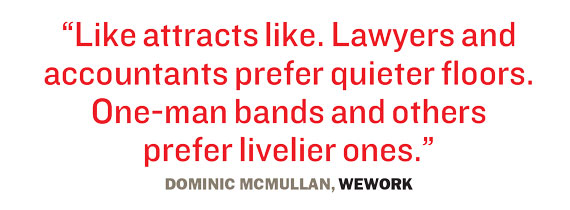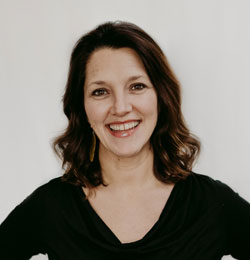At first glance, the Center for Social Innovation looks like your typical co-working or start-up office in the city. Inside the 27,000-square-foot former warehouse space at 601 West 26th Street in West Chelsea, there are rows of professionals sitting at long communal work tables and hunched over laptops, potluck lunch meetings, glassed-in offices occupied by smaller firms and, of course, high-design touches in the form of Herman Miller chairs.
But as its name suggests, CSI is focused on like-minded tenants drawn from the realms of philanthropy and social entrepreneurship. Founded in 2003, the Toronto-based nonprofit caters exclusively to organizations and individuals such as web designers, bookkeepers and lawyers whose work involves a social mission. Here in New York, the tenants include the consulting arm for GOOD Magazine, a publication about philanthropy, and the LGBT Bar Association. The space, which opened in 2013, has been operating at full capacity since 2014. Tenants apply for memberships starting at $125 a month for a part-time “hot desk,” with fees running up to $1,200 a month for a private enclosed office. The organization fundraises to pay for gaps in overhead costs.
William Elder, an executive vice president and managing director at RXR Realty [TRDataCustom], CSI’s landlord, said it was in part attracted to the organization for its lineup of cultural programs and symposiums that other tenants in the building — including Martha Stewart Living Omnimedia, architecture firm Diller Scofidio + Renfro, and Tommy Hilfiger USA — can attend. “It creates a great social experience for the entire building,” he said.
Both parties declined to say how much CSI’s rent is, but David Gise, CSI’s director of operations, hinted that the terms were very favorable for the nonprofit. “We have an extremely close relationship with our landlord,” he said.
Call it a “do-gooder” version of WeWork.
Today, New York City boasts 180 co-working locations totaling 6 million square feet, according to Newmark Grubb Knight Frank. Another 400,000 square feet are in the pipeline. But inspired in part by WeWork’s $16 billion valuation, entrepreneurs are now seeking ways to offer twists on the generalist model by supporting specific professions and interests. In an industry where WeWork occupies 2.7 million square feet, followed by Regus with 1.5 million square feet, most of these niche players are minnows. Although there are no official statistics on niche oo-working providers, Glenn Brill, managing director of real estate solutions at FTI Consulting, estimated that they make up roughly one quarter of the industry.
 In many ways, niche spaces are a logical outgrowth of the co-working explosion. Dominic McMullan, a WeWork spokesman, said that the company has anecdotally found that certain industries cluster within certain buildings in New York. For example, the tech and fashion industries tend to locate themselves in WeWork’s Meatpacking District and Soho locations, while professional services and financial tenants will head to its offices in the Financial District.
In many ways, niche spaces are a logical outgrowth of the co-working explosion. Dominic McMullan, a WeWork spokesman, said that the company has anecdotally found that certain industries cluster within certain buildings in New York. For example, the tech and fashion industries tend to locate themselves in WeWork’s Meatpacking District and Soho locations, while professional services and financial tenants will head to its offices in the Financial District.
“Like attracts like,” McMullan said. “Certain people and certain professions, like lawyers and accountants, prefer quieter floors. One-man bands and others prefer livelier ones where there is more foot traffic and therefore more company.”
For certain workers, especially members of the creative class, the appeal of niche co-working spaces is also the ability to access and share equipment.
At Neuehouse — which opened in 2013 on five floors of an industrial building at 110 East 25th Street — the users are typically mid-career, established creative professionals, including writers, filmmakers and fashion designers. The space’s upscale amenities include a broadcasting studio and screening rooms. In 2015, the company, which calls itself a “private workspace collective,” raised $25 million in venture funding from an undisclosed investor. In addition to New York, it has locations in Los Angeles and London.
With their focus on innovation, niche co-working spaces are seen as fostering the maker movement — a subculture of DIY individuals who apply engineering, programming, and arts and crafts to invent or recreate products. At the Brooklyn Navy Yard, the city is experimenting with New Lab, an 84,000-square-foot space that opened in June for entrepreneurs to share high-end product design and manufacturing tools that can create prototypes of their ideas. The concept has been promoted as a way of bringing manufacturing back to New York.
Niche co-working spaces like New Lab, which has specialized equipment, “are more likely to thrive,” Brill said, citing the high cost of maintenance. “These types of businesses have a higher barrier to entry for rivals,” he explained.

Primary co-founder Lisa Skye Hain
Yet despite the market potential, those experimenting with niche co-working business models face significant challenges. Small and community-oriented by nature, many do not survive. In 2015, Good Company, a co-working space at 16 West 23rd Street reserved for women, shuttered after nine years of business. The reason? It couldn’t afford the annual rent increases. “Our landlord was not willing to negotiate,” said Amy Abrams, the company’s co-founder, adding that she did not want to pass the rent hikes on to the members.
Others are forced to give up their narrow focus. The Productive Studios at 40 West 38t Street started out in 2012 as a space for animators, filmmakers and visual artists, but now those professions account for only about 30 percent of memberships, Susan Godfrey, the founder, said. The co-working space is now open to everybody.
Finding a suitable space can also be an issue. Wendy Xiao and Susann Friedrich, two former management consultants who met at Columbia Business School, have spent a year looking for a permanent space to house their venture, Co-Hatchery, which seeks to offer childcare inside a co-working space.
The founders declined to say how much investment they have raised. The start-up has some cachet: Its advisors include Joe Azrack, the founder of Apollo Global Real Estate Management.
However, that hasn’t helped Xiao and Friedrich tackle the city’s onerous licensing requirements and zoning rules for daycare centers. For example, spaces that serve infants must be on the ground floor, while those with toddlers can be only one floor up. The inspection process can take up to a year.
Last month, Co-Hatchery opened a pop-up location inside a tutoring center in Park Slope. The childcare component is housed in a subleased portion of Kidville, a children’s activity center and indoor gym across the street. There, teachers hired by Co-Hatchery care for the kids while their parents work.
Xiao and Friedrich are still seeking a permanent location in Manhattan — at least 3,000 square feet — on either the Upper West Side or Upper East Side, they said. “We’re two MBAs, we want to expand nationwide and globally,” Friedrich said.
This month, The Real Deal profiled four other niche co-working companies in New York City trying to grab market share.
Primary
26 Broadway

Primary co-founder Danny Orenstein
Before launching her own co-working space, Lisa Skye Hain was the first employee hired at WeWork as its head of community relations. She left WeWork 14 months after it launched in 2010, and went on to do stints at the Corcoran Group and BNI, a business networking and referral organization. All the while she was looking for the right co-working opportunity.
The idea for Primary came to her in 2013, when she flew to Portland, Oregon, to take care of her ailing mother. Once there, she absorbed the city’s “clean and green” mantra and began practicing yoga and meditation more often.
“That was when the aha moment came,” she said. “Wouldn’t it be amazing to give this lifestyle and these amenities to the small business owner in New York City?”
Two years later, Skye Hain and her co-founder and fellow WeWork alum Danny Orenstein secured “sizable” financing from a single investor — whom she declined to name — to start two co-working branches for health-conscious, mid-career business professionals. In May, they opened their first location, inside the landmarked former Standard Oil Building at 26 Broadway in the Financial District. The 25,000-square-foot space offers a WeWork-type co-working area for professionals to work — but also includes fitness studios and locker rooms stocked with towels and toiletries. In addition, the company curates a rotating schedule of classes, including yoga, guided meditation and strength training. The location can house 325 members. It now has about 200 members, Skye Hain said. Memberships start at $300 a month.
Skye Hain’s husband, Brian, serves as the company’s chief wellness officer (as well as boot camp instructor.)
For their second location, the founders are considering spaces in the Flatiron District, NoMad or Midtown South. Although they have their sights set on other cities, they are not interested in becoming WeWork.
“We’re not looking to open 30 locations in Manhattan,” Skye Hain said. “We’re going for more of an intimate community feel.”
Collab
304 Hudson Street
In 2009, Marc and Adina Levin, two married industrial designers who worked in the fashion and product design industry, initially started Collab as a space for themselves and colleagues. After investing $500,000, they have since opened the 5,000-square-foot space at 304 Hudson Street to industrial designers, architects, engineers and other creative entrepreneurs.
“New York City is still very underserved in fabrication and innovation spaces,” Marc said.
The warehouse is outfitted with such equipment as a laser cutter, a 3D printer and industrial sewing machines. Members make things that range from robots to elaborate educational pop-up books. The studio has a capacity to host up to 30 members, of which there are currently 24. Monthly fees range from $750 for individuals to $2,000 for a small private studio.
In the model of the Brooklyn Navy Yard, Collab doubles as an “accelerator” for small businesses. So far, 10 companies, including electronic building-blocks maker littleBits, triangular chalk-stick maker Chalkables, and multisensory ride developer Sensorama, have launched and now have a combined valuation in excess of $700 million, according to the company’s estimates.
The Levins are now looking for a 40,000- to 50,000-square-foot space in Brooklyn so they can expand their business.
Con Artist Collective
119 Ludlow Street

Con Artist Collective founder Brian Shevlin
Brian Shevlin, a former graphic designer, opened Con Artist Collective, a studio space for artists, the same year that WeWork launched. The word “co-working” wasn’t even in his vocabulary. Now, six years later, he marveled at their different trajectories. “They are real estate moguls,” Shevlin said. “We’re a Lower East Side neighborhood space.”
Nevertheless, his 3,000-square-foot co-working studio at 119 Ludlow Street now boasts 600 members who pay up to $299 a month for full-time, unlimited access to the space. His clients have access to two floors of artists’ workspaces stocked with tools for all kinds of projects, including a silk-screen press and a power washer. There is also a “clean space,” where members can work on their laptops in a paint-free environment.
The storefront is used as a gallery, which members can rent for solo shows. Group shows are a collaborative effort.
Unlike WeWork, Shevlin has rules about how members spend their time in the co-working space. For example, he said, a member who joined to paint and draw but was spending too much time doing paperwork and conducting meetings was asked to do that kind of work off-site.
Although he is not currently in discussions with any landlords, Shevlin said he was exploring other locations, including Brooklyn, Queens and New Jersey. His lease comes up in three years. He pays $10,000 a month in rent; the remaining overhead hovers around $7,000 a month, he said.
Shevlin said that it’s not just office types with laptops who crave co-working environments. “Artists have struggled with this same issue forever,” he said. He compared it to exercising. “You can do push-ups in your living room, but you’re going to the gym to have a reason to work out, see and learn from other people working out.”
Paragraph
35 West 14th Street
Paragraph is the brainchild of Joy Parisi and Lila Cecil, who earned MFAs at the New School and wanted to re-create the writing community they’ d left behind. In 2005, after pulling together their savings, plus a $25,000 loan for furniture and equipment, the duo established Paragraph in a 3,000-square-foot space at 35 West 14th Street.
“The gods were smiling down on us,” Parisi said, of finding Paragraph’s location. They found a space that was extremely quiet and a landlord willing to grant their users 24-hour access. Their build-out included installing a soundproof dividing wall between the kitchen and the writing area.
The space, which has 38 partitioned desks, serves only writers. A full-time membership costs $205 a month. Perks of the membership include access to a monthly roundtable with literary agents and editors and access to affiliated spaces in Chicago and Toronto.
In 2015, Parisi bought out her partner and is now running the business solo. Keeping up with climbing rents has been a challenge. In 2010, the tail end of the financial crisis, the founders were able to renegotiate their rent. But in 2015, the city’s real estate landscape was vastly different.
“Our rent pretty much doubled,” Parisi said. “We are trying to keep our rates low, but it’s feeling more and more impossible for small business in the city.”
She is considering moving to Los Angeles, in part because it’s more affordable.
“It’s not a hugely profitable business, that’s not the point,” she said.
